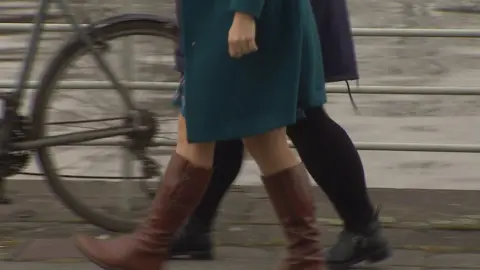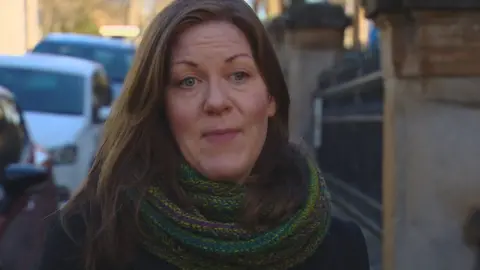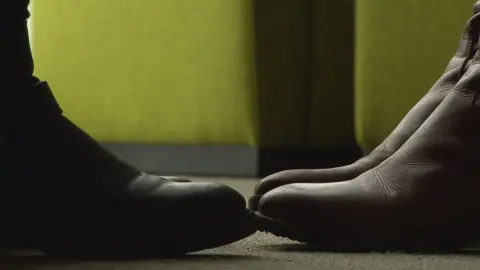Sex attack victims usually know attacker, says new study
 BBC
BBCMore than 90% of rape and sexual assault victims know their attacker, a new study of almost 1,000 victims says.
Researchers from Glasgow University said it was a popular misconception that most attackers were strangers.
The study looked at the 991 women in Scotland who went through an advocacy programme, which ran for 18 months.
It found that despite many reforms to rape laws, women still suffered as a result of delays and the impersonal nature of the justice system.
The study also found:
- Just 9% of perpetrators were strangers to the victim
- 23% of women were assaulted by a partner or ex-partner
- 24% were assaulted a family member
- 44% were assaulted by "another known person"
- 32% were reported to the police more than two years after the incident
- More than 20% of the women took more than 10 years to report their ordeal to the police
- 22% had not reported their assaults to the police at all.
Justice Secretary Michael Matheson told BBC Scotland the advocacy service, which was designed to help victims through the justice process, had shown "real value".
The minister announced a further £1.7m over the next two years so that programme could continue and expand.
The advocacy programme involved a dedicated support worker taking women to appointments and guiding them through the system.
Dr Oona Brooks-Hay, one of the Glasgow University academics behind the evaluation report, said it showed the advocacy service had worked well but there were still considerable problems with the justice system.
The lecturer in criminology told BBC Scotland said: "One of the biggest challenges for women, in addition to the trauma and distress of going to the police and reporting a rape or sexual assault, is the length of time it can take after that point."
She said it could often take more than a year for cases to come to court, with delays and uncertainties during that time.

Dr Brooks-Hay said the advocacy programme could help women deal with this as well as the court process, which often asks in-depth and detailed questions on sensitive issues.
She said: "It is absolutely right that the judicial process should be robust.
"When we think about the questions women are asked in a rape trial you have to think about the relevance of those questions to the incident that took place.
"We would certainly question any defence of lines of questioning that go beyond that, looking at previous incidents or, for example, looking at previous relationships or partners which are not relevant and could potentially prejudice the minds of the jury."
Dr Brooks-Hay said the research showed rape and the criminal justice process was still quite different from what the general public think it is.
She said: "For example less than 10% of the people accessing the advocacy service were raped or sexually assaulted by strangers yet that is still something that is a popular conception in the mind of the public and, of course, juries.
"That is quite difficult for survivors themselves to reconcile and also the criminal justice process."
The study included in-depth interviews with a number of the women.

One victim/survivor described the criminal justice system as "almost like a fortress that you can't get through".
Another said: "It just got bigger and bigger and more scary and intimidating and then you start talking about procurator fiscals and courts and witnesses and safety screens, protective measures in court and things that…and you just start thinking, oh my God, why do I have to do all this, you know? This is really scary."
The case study women said the advocacy programme was able to support them through the process, explaining the procedure and the jargon.
One victim-survivor said: "Just being informed I think is really, really important at every stage.
"It just allows you to feel a bit more in control, I guess, because everything's been out of control for so long."
Huge difference
Rape Crisis Scotland chief executive Sandy Brindley said: "Reporting a sexual crime and going through the justice process can be a difficult experience.
"What this research tells us is that having someone to support you throughout the process can make a huge difference."
The latest stats (2016-17) show conviction rates for rape and attempted are lower than any other crime, at 39%.
They showed the number of cases making it to court had doubled in a decade but the rate of conviction had gone down.
The conviction rate for sexual assault is 60%, still much lower than crimes of dishonesty which is 88%.
Liaison with victims
Scotland's Justice Secretary said: "Sexual crimes, especially rape, can often leave victims very vulnerable and reluctant to come forward and report these matters.
"What I'm absolutely determined to do is make sure we do everything possible to provide victims with the assistance they require."
Mr Matheson said victims had found the advocacy programme "extremely valuable in supporting them".
"That's why I want to expand it because we need to make sure women have the confidence to come forward and report these issues," he said.
Sexual offences
The Crown Office and Procurator Fiscal Service (COPFS) said it was "fully aware of the impact the court process can have on victims".
A spokesman said: "Since September 2017, all Victim Information Advice (VIA) staff who work on High Court sexual offences cases have a geographic responsibility for liaison with victims within their area with a dedicated VIA Officer allocated to each new case.
"In December an agreement was signed with Rape Crisis Scotland allowing the sharing of anonymous feedback on victims' experiences of the criminal justice system and their views on the service provided by COPFS.
"This feedback process provides a mechanism to ensure the voice of the victim is heard and will be used to identify ways COPFS can improve the service provided to victims of sexual crime."
